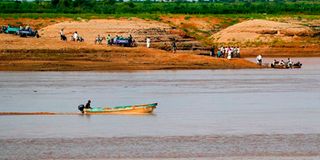Sudan summons Ethiopia envoy over bodies found in river

A boat sails along the Setit river bordering Ethiopia, at Wad al-Hiliou, a village in the eastern Sudanese state of Kassala, on August 11, 2021. Tigrayan refugees who recover bodies washing up on the banks of the river, fear they are evidence of mass executions by government-allied troops in Tigray.
Sudan summoned the Ethiopian ambassador recently over the recovery of bodies that Khartoum says are deceased Tigrayans from the river bordering Ethiopia's conflict-hit Tigray region, state media reported Wednesday.
Since late July, dozens of bodies have been recovered from the Setit River -- known in Ethiopia as the Tekeze -- which runs through its northern Tigray region, according to residents from Wad al-Hiliou in Sudan's eastern Kassala state.
Sudan's "foreign ministry summoned the Ethiopian ambassador on August 30 against the backdrop of Sudanese authorities finding 29 bodies in Setit River" between July 26 and August 8, the ministry said in a statement carried by the official SUNA news agency.
"The ministry informed the ambassador that the bodies belonged to Ethiopian nationals from the Tigrayan ethnic group," it said.
Last month, ethnic Tigrayans long resident in Wad a-Hiliou who helped recover the bodies told AFP that the corpses were mostly bloated, deformed, and bore gunshot wounds or deep slashes.
But they also said some bodies had tattoos written in their language -- Tigrinya.
Some corpses had missing body parts and almost all had their hands tied behind their backs, they said.
The discovery of the bodies came as allegations have swirled of atrocities, ethnic cleansing and mass killings, including a massacre in the town of Humera, in western Tigray.
The Tekeze river runs through Humera.
The Ethiopian government dismissed the allegations as "fabricated".
Tigray has been the scene of a deadly conflict since November between Ethiopia's federal forces and the region's ruling party, the Tigray People's Liberation Front (TPLF).
Ethiopian Prime Minister Abiy Ahmed, a 2019 Nobel Peace Prize winner, said his forces' move into the region was in response to TPLF attacks on federal army camps.
The fighting has killed thousands, according to the United Nations, and sent tens of thousands fleeing into neighbouring Sudan.
The escalating conflict added to souring relations between Khartoum and Addis Ababa in recent months over Ethiopian farmers' use of a fertile border region claimed by Sudan.
The two countries are also at odds over the Grand Ethiopian Renaissance Dam (GERD) which broke ground in 2011, a regional dispute over Nile river water resources that also involves Egypt.
Both Egypt and Sudan are downstream from Ethiopia.
In late August, Ethiopian officials said they had thwarted an attack on the GERD by armed groups "who have been trained and armed by Sudan".
Sudan flatly denied the allegations, saying they were "baseless".





